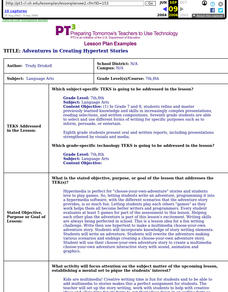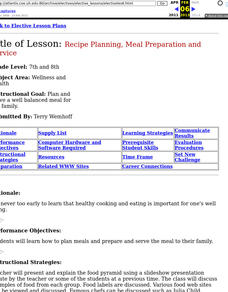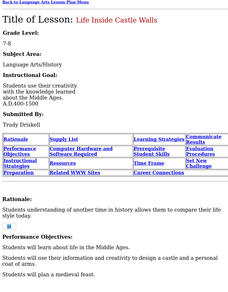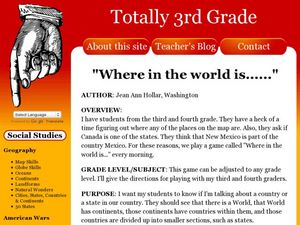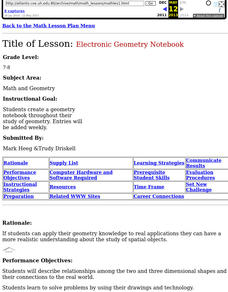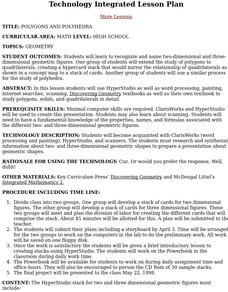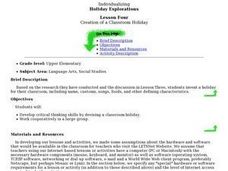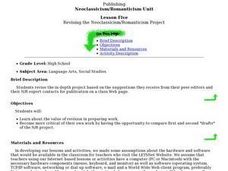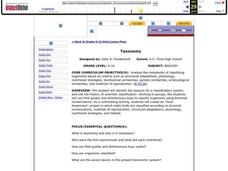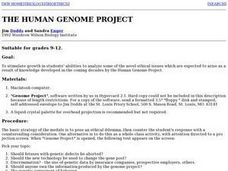HyperCard Teacher Resources
Find HyperCard lesson plans and worksheets
Showing 25 resources
Curated OER
Interactive Tutorial on Inheritance Patterns Using Hypercard
Young scholars participate in an interactive tutorial program designed to directly observe a variety of inheritance patterns. They select problems relating to genetics. They perform a calculation and receive feedback to reinforce their...
Curated OER
Use of Hypercard to Create an Interactive Tutorial on Inheritance Patterns
Students use this interactive tutorial program to directly observe a variety of inheritance patterns. They develop mastery over the variety of genetics problems presented. This simulation is designed to promote the acquisition of skill...
Curated OER
Adventures in Creating Hypertext Stories
Use hypertext to make a multimedia choose-your-own adventure story! Young writers incorporate knowledge of story writing elements to write their own stories, and rewrite the adventure with various scenarios and endings. Use technology to...
Curated OER
Genetics and Hypermedia
Students use HyperCard and HyperStudio because it allows them to become more creative. They are exploring a new and different studying style and independence in their analysis and reporting of data. This is a great outlet for students...
Curated OER
Genetics and Hypermedia
Students view presentations created by HyperCard and HyperStudio. They observe the multimedia presentation regarding Genetics. They observe the information in regards to their current unit.
Curated OER
Recipe Planning, Meal Preparation and Service
Students examine how to plan, prepare, and serve a meal. They analyze the food pyramid, select five recipes, plan a dinner menu, create a HyperCard stack of the menu, and prepare the meal for their family.
Curated OER
What Is Your Explanation for the Evidence?
Students encounter an interactive computer program activity designed as a diagnostic of student beliefs related to the theory of evolution. Students process the Hypercard cascades structured around a set of biological topics related to...
Curated OER
Would You Like to Become a Millionaire?
Young scholars answer questions written by other teams about literature in an attempt to become "millionaires." In small groups they write a motivational introduction to their teams selected books, publish their questions as a HyperCard...
Curated OER
Life Inside Castle Walls
Students use their creativity with the knowledge learned about the Middle Ages. A.D.400-1500. They use their information and creativity to design a castle and a personal coat of arms, then plan a medieval feast.
Curated OER
Where in the World is...?
Students work in groups to locate an appropriate planet where inhabitants of a fictional place can be relocated. They create a PowerPoint presentation to introduce their relocation site, as well as ecosystem information about the site....
Curated OER
Computer Mysteries
Who has been messing with my trampoline? Young writers choose local events as the basis for their own “Who Did It?” mystery. They then devise a plot, problem, and cast of characters and write an introduction explaining the problem and...
Curated OER
Electronic Geometry Notebook
Students examine the relationship between two and three dimensional shapes. They use their drawings to solve problems. They create a notebook of the formulas and how they relate to the real world.
Curated OER
Students Exploring Cyberspace (SECs) Project
Students study AIDS and other current topics in a multinational, interdisciplinary fashion. They communicate with students from other countries throughout e-mail to find out how AIDS impacts other societies.
Curated OER
Polygons And Polyhedra
Students recognize and name two-dimensional and three-dimensional geometric figures. One group of students will extend the study of polygons to quadrilaterals while another group of students will extend the study of polygons to...
Curated OER
CREATING A CLASSROOM HOLIDAY
Students invents a holiday for their classroom, including name, customs, songs, foods, and other defining characteristics based on the research they have conducted and the discussion in Lesson Three.
Curated OER
Revising the Neoclassicism/Romanticism Project
High schoolers revise the in-depth project based on the suggestions they receive from their peer editors and their N/R expert contacts for publication on a class Web page.
Curated OER
Storytelling Electronically
Learners explore the features of Microsoft PowerPoint. They use the advanced features to develop an electronic storybook. Students use a flatbed scanner and the Internet to develop their storybooks.
Curated OER
Taxonomy
Students analyze the complexity of organism classifications based on certain criteria. In this classifying organisms lesson students study taxonomy and gather information and leaves to do their own experiment on classification.
Curated OER
Critiquing the Neoclassicism/Romanticism Project
Students request feedback on their projects from Neoclassicist/Romanticist experts they have contacted via e-mail or other means. They work in pairs to critique each other's work.
Curated OER
Production Time
Seventh graders identify terms related to computer-generated productions (e.g., desktop publishing, WYSIWYG, clip art, hypertext, multimedia, laserdisc, CD-ROM, VCR, scanners, camcorders).
Curated OER
Pick a Holiday
Students use the Internet resources provided and their own searches to select and investigate a holiday of interest to them. They present their findings to the rest of the class in a format of their choice.
Curated OER
Pick a Holiday
Students use the internet to research a holiday of interest to them. After researching the holiday, they research the country, culture and group who celebrates it and why. They create a presentation to share their information with the...
Curated OER
Where in the World is..?: An ecological study
Students analyze different ecosystems from the perspective of someone from another planet. They compare different ecosystems to determine which would be suitable to inhabit. This is an interdisciplinary activity.
Curated OER
The Human Geonome Project
Learners explore the Human Genome Project (HGP). Students research a fact situation, examine genetic data given, and discuss choices available for a solution. Learners consider the ethical question and consequences of each choice.




